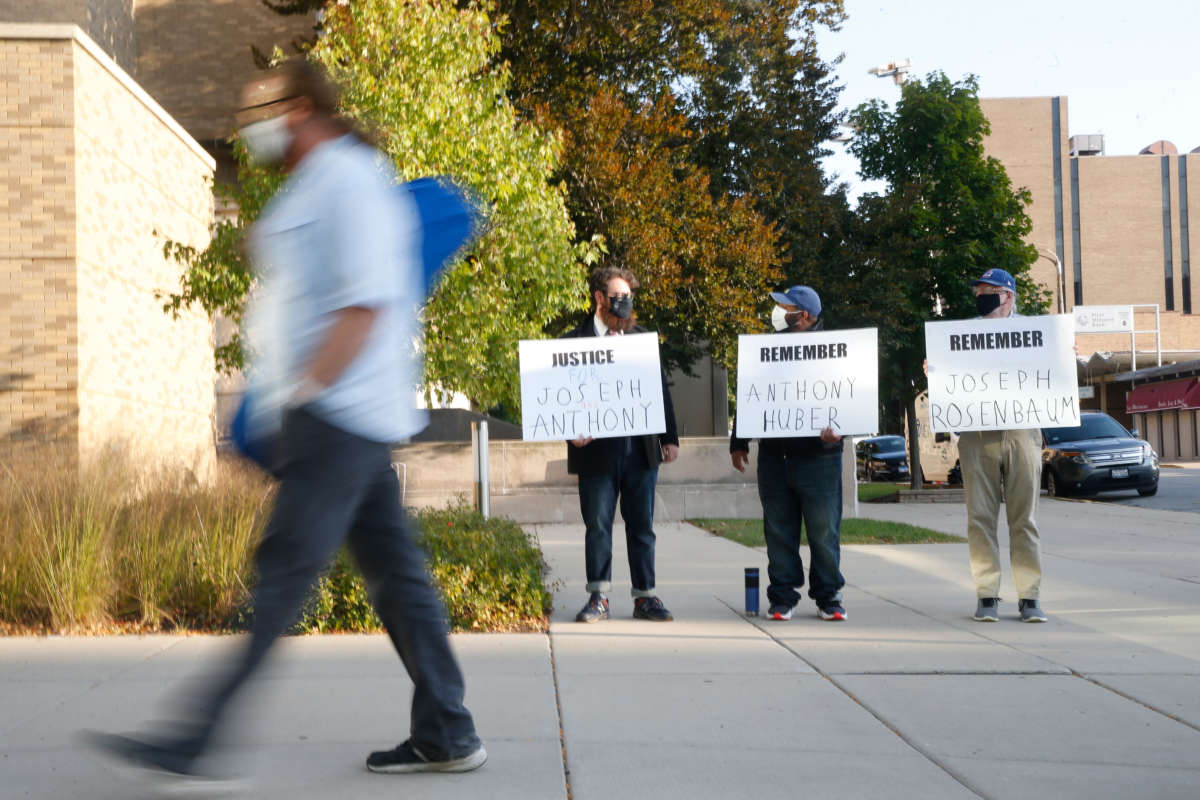Honest, paywall-free news is rare. Please support our boldly independent journalism with a donation of any size.
The three men Kyle Rittenhouse shot during a protest against police brutality in Wisconsin last summer can be characterized as “rioters,” “looters,” or “arsonists” — but not victims, the judge in his murder trial ruled this week.
On Monday, Wisconsin Circuit Judge Bruce Schroeder laid out the finalized rules for Rittenhouse’s trial, which is set to start with jury selection next week. Schroeder said that he will not allow prosecutors to use “loaded” words when describing the individuals that Rittenhouse shot, including the word “victim.”
“The word ‘victim’ is a loaded, loaded word,” Schroeder said. “‘Alleged victim’ is a cousin to it.”
In August 2020, then-17-year-old Rittenhouse shot and killed Joseph Rosenbaum and Anthony Huber at an uprising in Kenosha in response to the police shooting of Jacob Blake, a Black man who was shot in the back seven times by a white officer earlier that month. That night, Rittenhouse also shot and wounded a third man, Gaige Grosskreutz.
Rittenhouse joined unauthorized militia groups during the protests, traveling to Kenosha with an assault rifle under the guise of offering “protection” to local businesses. Though prosecutors say they have evidence showing that Rittenhouse pursued at least one of the individuals he shot, Rittenhouse is claiming he shot the protestors in self-defense.
Despite not allowing prosecutors to refer to the individuals Rittenhouse shot as “victims,” Shroeder is allowing defense lawyers to describe them as “looters,” “rioters” and “arsonists.”
Assistant District Attorney Thomas Binger called the rules a double standard, noting during the court hearing that terms “such as rioter, looter and arsonist are as loaded, if not more loaded, than the term ‘victim.'”
Binger also noted that Schroeder was inconsistent in his “victims” rule, which is apparently a long-held policy of the judge inside his courtroom. “You’ve not let me call someone a victim when it was proven,” he said.
Binger argued that referring to the three men as “looters” or “rioters” is particularly unjust because these phrases serve to give the impression that Rittenhouse’s actions were justified.
Beyond barring the description of the men Rittenhouse shot as “victims,” Schroeder has ruled that prosecutors cannot bring up Rittenhouse’s connections to the Proud Boys, a white nationalist organization that has a history of inciting violence at protests. Schroeder, who admitted last month he had never even heard of the group before this trial, said that Rittenhouse’s association with the Proud Boys wasn’t relevant to the case — despite the fact that shortly after the fatal shootings last year, Rittenhouse flashed a hate symbol and posed for pictures with the group in a Wisconsin bar.
Several journalists have noted that the judge in the Rittenhouse trial has a long history of cruel and outrageous courtroom rulings. Shroeder once ordered a 28-year-old woman convicted of retail theft to announce her criminal record to the management of any store she entered in the future — a ruling that was eventually overruled in an appeals court.
Schroeder’s biased and inconsistent rulings are so widely known that over the course of his career, hundreds of defendants have made formal requests, many of them granted, for a different judge to preside over their cases. This has led to backlogs of cases being heard in Kenosha County.
Trump is silencing political dissent. We appeal for your support.
Progressive nonprofits are the latest target caught in Trump’s crosshairs. With the aim of eliminating political opposition, Trump and his sycophants are working to curb government funding, constrain private foundations, and even cut tax-exempt status from organizations he dislikes.
We’re concerned, because Truthout is not immune to such bad-faith attacks.
We can only resist Trump’s attacks by cultivating a strong base of support. The right-wing mediasphere is funded comfortably by billionaire owners and venture capitalist philanthropists. At Truthout, we have you.
Our fundraising campaign is over, but we fell a bit short and still need your help. Please take a meaningful action in the fight against authoritarianism: make a one-time or monthly donation to Truthout. If you have the means, please dig deep.
